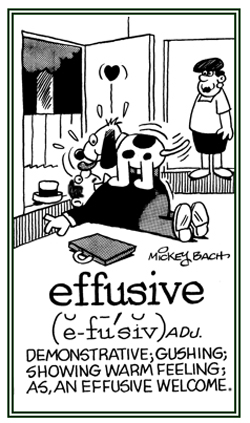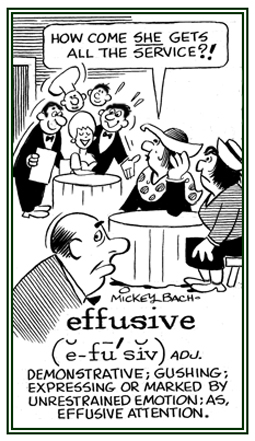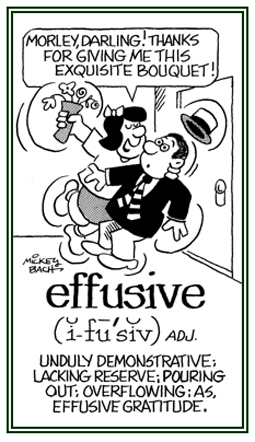fus-, fun-, fund-, fut-, found-
(Latin > French: pour, melt, blend)
2. A cloth screen, piece of frosted glass, or other material that is used to soften the brightness of the lighting in photography or cinematography.
3. A device; for example, a cone or wedge, fixed inside a loudspeaker to diffuse sound waves.
4. A flow passage in a wind tunnel that decelerates a stream of gas or liquid from a high to a low velocity.
2. Capable of passing through animal membranes by osmosis.
A disrupted flow of water indicates where there could be an underlying abnormality in the brain.
2. A new type of magnetic resonance technology which has, among other things, for the first time shown "white matter" in action, revealing its role in the brain.Although gray matter (composed of neurons) does the brain's thinking and calculating, white matter (composed of myelin-coated axons, or long fibers of nerve cells), control the signals which neurons share, co-ordinating how well brain regions work together.
Diffusion tensor imaging (DTI) is done with the same kind of magnetic resonance imaging (MRI) machines found in hospitals; however, it involves a different type of magnetic field and different algorithms to create the many brain-image slices that are assembled into a three-dimensional picture.
DWI, or diffusion weighted imaging, has been demonstrated to be more sensitive for the early detection of stroke than standard pulse sequences and is closely related to temperature mapping.
Water, air, and light; dust, smoke and odors, are diffusive substances.
2. Extended; spread widely; extending in all directions; extensive; as diffusive charity or benevolence.2. To spread out or to radiate from something.
2. In medicine, an escape of fluid into a body cavity: The surgeon installed a thin tube into the incision of the abdomen of the patient which would control the effusion, allowing it to drain out of the body and not contribute to possible infections.
3. An instance of unrestrained speech or writing: Although initially very controlled, the convocation speaker eventually spoke with great effusion about the future that lay before the graduate students.
2. Characteristic of giving or involving an extravagant, and sometimes excessive declaration, of feelings in speech or writing: When Jack and his family arrived at his parent's house, they were greeted with an effusive welcome.



Go to this Word A Day Revisited Index
so you can see more of Mickey Bach's cartoons.
2. A reference to being profuse and overflowing.
2. Immunodiffusion in which the antigens are separated according to their migration in an electric field.
Immunodiffusiion is the technique for analyzing antigen (a protein molecule that often protrudes from the surface of a cell which can induce an immune response) and antibody mixtures by watching them as they diffuse toward each other within a support medium (usually a gel).
2. The use of intense beams of electrons to implode small pellets of deuterium and tritium so that they reach the temperature and density required for initiating a fusion reaction.
2. The amount of space in which a target appears to occupy in a radar resolution cell, as it appears to that radar beam.


